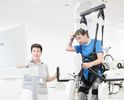The most common conditions treated in neurological rehabilitation clinics are strokes, brain bleeds or brain injuries, which have a profound impact on the lives of those affected, in some cases leading to the complete loss of functions.
Neurological rehabilitation in Germany is divided into distinct phases from A to F. The intensive medical care (phase A) is directly followed by early rehabilitation (phases BJ and post-trial rehabilitation (phase C). This is followed by follow-up treatment (phase D) or further inpatient and/or outpatient rehabilitation (phases E). If a patient remains permanently dependent on support due the final stage in the treatment cycle is maintenance care (phase F).
The early rehabilitation (phase B) is an acute hospital treatment that is offered in seven specialist clinics at MEDIAN. Phase C and D rehabilitation is offered in a total of 18 facilities.
Neurological rehabilitation objectives:
- Recovery of health and capacity and reintegration into home life and professional life where possible.
- Developing compensation skills for neurological disorders, especially in the areas of motor skills, language and cognitive brain functions.
- Encouraging appropriate self-management.
Areas of expertise
- Neurobehavioural rehabilitation
Strokes, brain injuries or infections often lead to neurological challenges such as memory impairment, loss of concentration and behavioural problems, which are treated in individual and group therapy sessions. - Equipment-assisted therapy
Using devices and tools, such as treadmills, to support patients to improve their ability to move and walk. - Botulinum toxin therapy
Sonographically controlled injections of botulinum toxinA to treat muscle rigidity and uncontrollable spasms. - Mirror therapy
- Speech and swallowing conditions: diagnostics and therapy
- Balance training with the Wii balance board
